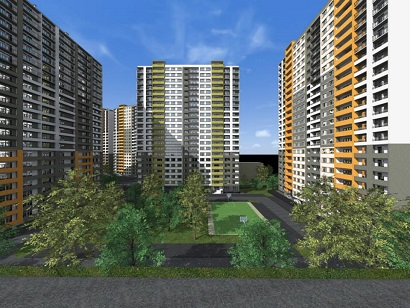New homes ahead for Georgian's displaced by war

A significant project to provide long-term housing for Georgia’s Internally Displaced Persons (IDPs) accommodation has lunched.
A 107 million GEL project to construct new residential complex properties for IDPs has been implemented by the Ministry of Internally Displaced Persons from the Occupied Territories, Accommodation and Refugees of Georgia.
This is the first time such a large-scale construction project will be realized within the allocations of he state budget, the Ministry announced.
Apartment buildings for long-term housing for refugees will be constructed in Tbilisi's Krtsanisi district.
In the first stage, four 22-floor building will be constructed where 1032 IDP families will live.
The multi-million dollar project will fund the cost of restoring 2088 residential apartments in Tbilisi. Construction will be completed by summer 2016.
"After 20 years of occupation of Abkhazia and South Ossetia, during the displacement of our inhabitants, this is the first time the Government is launching a large-scale project of long-term resettlement of refugees. Today the tender committee of the Ministry announced a tender for the procurement of eight 22-floor buildings in the Krtsanisi district,” Minister of Internally Displaced Persons from the Occupied Territories Davit Darakhvelidze said.
This is part of the developments Prime Minister Irakli Garibashvili focused on during his speech at a community meeting in Dadian Palace, in Georgia’s western region of Zugdidi on April 2.
Given the scale of construction, the project will be split into three parts.
The Ministry announced slightly more than 56.5 milliom GEL had been allocated to the first stage of construction.
The second and third phases will be announced after the first tender winner company completed two month preparatory work for construction of the apartments.
Since the conflicts of the1990s and the 2008 August War, Georgia has experienced a high influx of IDPs.
Conflicts in Abkhazia and South Ossetia during the 1990s caused around 236,000 people to become internally displaced. Later, due to the 2008 August War, 17,000 people had to run away from their homes.
Meanwhile, approximately 8 000 families, who were displaced in the Georgian-Russian war in 2008, got a "newly constructed cottage in a purpose-built settlement, a refurbished apartment in an existing village, or $10,000 in lieu of these housing options" by the Georgia’s former government .
In contrast to this pattern of resettlement, only ten percent of the IDPs displaced in 1990s have benefited from housing solutions. Others are still living with friends or relatives. Some occupy hospitals, schools and other previously state-owned buildings, which are not adequately equipped for housing.
 Tweet
Tweet  Share
Share